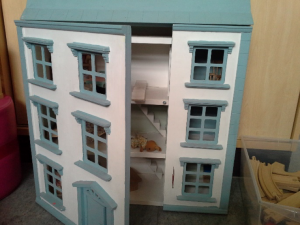Doll's House Therapy
By Play Therapy UK  By watching a child play with a doll’s house, a therapist can discover a lot about them as the child’s unconscious mind expresses itself through play.
By watching a child play with a doll’s house, a therapist can discover a lot about them as the child’s unconscious mind expresses itself through play.
How the classic doll’s house is being used in play therapy to help heal emotional and psychological problems in children.
The toolkit of a Play Therapist is made up of toys and a wide range of creative arts materials which allow children to play, create and express themselves in a way of their choosing. Play therapy utilises these props to heal children’s emotional, behavioural and other psychological problems. The toys vary widely and represent different things such as real life, fantasy, scary scenarios or sensory exploration. Examples include puppets, figurines, animals, cars, swords, dolls, medical kits and more. They allow the children to explore all sorts of ideas and situations in a safe and supportive environment.
The doll’s house is a particularly useful tool for the Play Therapist. In the western world, doll’s houses appear to have shared meanings for many. They symbolise a microcosm viewpoint of past, present and future homes, reflecting the social function of different rooms and human interaction within them. They evoke feelings from around the home and about family relationships. By watching a child play with a doll’s house, a therapist can discover a lot about them as the child’s unconscious mind expresses itself through play.
What you can do at home
If you buy a doll’s house, let your child choose one themselves. But you can make one too! Find a clean old box, other bits of cardboard, some sticky tape and glue and maybe some appropriate paint. Have fun helping your child build the house to their design. Maybe your son will create a fort or castle rather than a doll’s house – it’s the same thing! Then let them play as they want to – just keep them safe and join in only if they ask you. No, this isn’t play therapy. It’s called non-directive play and it will help your children to develop naturally and may help with any slight emotional well-being issues.
Contributed by Play Therapy UK, adapted from a paper by Jeanne McLaughlin, Certified Play Therapist. If you are worried about your child’s emotional, behaviour or mental health issues contact your nearest Play Therapy UK registrant: www.playtherapyregister.org.uk.